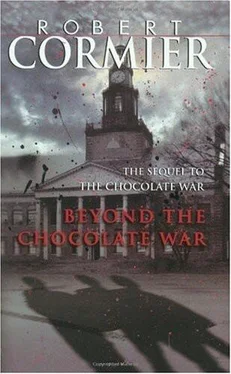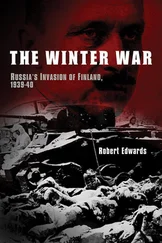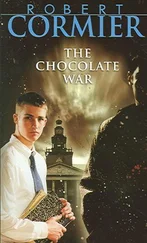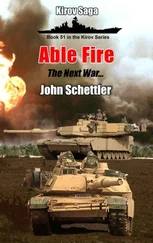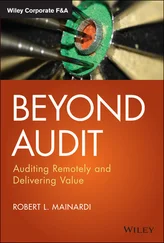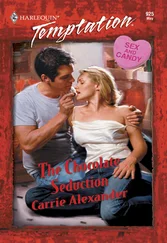"What has all this got to do with—" David began.
And saw that Brother Leon had tricked him, diverted his attention, gotten him to let down his guard, loosening his grasp on the knife, losing his concentration as he inclined his head to listen to the sounds from outside. Astonishingly, without warning, he was seized from behind and a hand struck his wrist, pain shooting up his arm, stinging and burning, causing him to drop the knife. Cries filled the room, and scuffling, and David closed his eyes, flailing his arms, striking out blindly at whoever had sneaked in while he was talking to Brother Leon. Anger or madness or something beyond both gripped him. He whirled, tore at his attackers, kicked out, heard clothes ripping, tasted something warm in his mouth as he spun away.
"Watch out. ."
"Get him. ."
He opened his eyes and found himself at bay facing Brother Leon and Brother Armand.
They were crouched, hands on their knees, stalking him as if he were an animal on the loose.
"Give up, Caroni," Brother Leon urged. "You cannot escape. . "
Brother Armand's voice was softer, more compelling. "You need help, David. We will help you. ."
But the voice within him was stronger:
Get away. Leave this place. It's too late to carry out the command now. You have botched it up.
Ah, he answered, there's one other thing I can do. That I won't botch up.
The knife lay on the floor, useless to him now.
He knew he had one advantage:
The door was at his back.
He backed toward it cautiously, one step at a time, hoping no one else was in the residence. Please, dear God, he prayed silently, let me get away and then end this agony.
He was in the doorway at last.
Saw Brother Leon's hand reaching for the telephone on the desk. A call to the police would doom him.
Knew this was the moment when he must act, get away. Yet had to wait for the command. He stood there breathless. At last the command came.
He turned and ran.
The Trinity grounds lay battered and bruised in the fading sunlight. The lawn and parking lot were free now of the debris left by hundreds of people playing, eating, drinking, cavorting, and making merry in the carnival atmosphere of Fair Day. Ground crews had moved in to scoop up the accumulation of paper cups, popcorn boxes, hot dog containers, and all the other rubbish left over from the event. The lawn was trampled and tired, the abandoned booths and tables looming like the skeletons of awkward animals in the dying light.
It had been a typical Fair Day, thronged with young and old, blessed with sunshine and high spirits. The only sobering incident had been the arrival of a police cruiser at midafternoon, howling its way to the front door of the residence, where Brother Leon greeted the officers as they leaped from the vehicle. A small crowd flowed toward the cruiser and rumors immediately ran rampant. A bomb scare, someone said, which was not at all unusual. A robbery foiled by Brother Leon, someone else reported, with the robber running off toward Main Street. In fact, Brother Leon pointed in that direction as he talked to the police officers. When a second cruiser arrived a moment later, the first cruiser sped off in the direction of Main Street. Meanwhile, a massive policeman, with beefy jowls and a huge stomach that rippled as he walked, waved off the onlookers, dispersing the crowd. "It's all over," he kept saying, and refused to answer any questions.
A few minutes later Brother Leon's voice crackled over the loudspeakers, interrupting a medley of disco tunes.
"We have had a minor disturbance in the residence, but all has returned to normal," he said. "Please continue to enjoy yourselves. There is no cause for alarm or a disruption of this pleasant occasion."
The music resumed, and so did the festivities. By the time the fair drew to its conclusion in early evening, the visit of the police cruisers had either been completely forgotten or had become an object of idle curiosity and speculation, apparently not serious at all.
Ray Bannister wished the afternoon incident had been serious. . serious enough to call a halt to the proceedings of Fair Day and, in particular, the evening program. He walked reluctantly toward the main school building, head down, as if searching for dropped money. He was not searching for money. He was searching for a valid reason to call off tonight's program. He honestly did not want any part of it. Earlier, of course, he had been excited about the performance, his stage debut before the student body: anticipating the attention and applause of the audience. But Obie's behavior of the past few days had made him uneasy. More than uneasy, suspicious. Obie had conducted himself like a madman, in a frenzy, rushing into Ray's house at all hours to rehearse the small part he would play as Ray's assistant, eyes too bright, talking too much, pacing the floor, then falling into sudden brooding silences.
"What's wrong, Obie?" Ray had finally asked.
"Nothing's wrong," Obie snapped. "Why do you ask?"
"Because you're acting. . strange. Like this is a life-and-death proposition. It's only a magic show. Hell, I should be nervous."
"I want everything to go right," Obie said. "This is the big senior night at Trinity."
"It'll go fine," Ray assured him, although himself unconvinced.
"Let's rehearse again," Obie said. "Show me again how the guillotine works. . "
Ray paused now, before entering the building, wishing he were home or back at Cape Cod. A few stragglers preceded him, one of the kids holding the door open, an unexpected politeness. Ray's name had appeared on posters announcing the "Magic Night" program — Bafflement by Bannister. He had felt like a minor celebrity, aware of students glancing at him. Tom Chiumento, one of the good guys, nodded in friendly fashion as they met in the corridor. All this pleased Ray, at first. Then made him uneasy. Not quite sure why, but then everything about Trinity made him uneasy. And especially Obie. More than once Ray had thought about canceling his appearance, but he hated the idea of disappointing Obie, the only student at Trinity to extend friendship. Or what seemed to be friendship.
Stepping into the building, Ray heard a rustling sound, like a distant gathering of insects. He followed it along the corridor, the buzzing now louder, now softer, inconsistent, strange to his ears. Not the usual rowdy sounds of typical Trinity assemblies or gatherings for basketball or baseball games. In the assembly hall Ray's eyes were drawn immediately to the stage, where he saw the reason for the curious attitude of the students. Center stage, in a spotlight, standing alone in what seemed like an immensity of space, was the guillotine. Ugly, dangerous, blade gleaming in the harshness of the spotlight's glare, a nightmare object suddenly thrust into reality. Or maybe, Ray Bannister thought, it's me, dramatizing, exaggerating. But as he looked around the auditorium at the other students leaning forward or tilting toward each other, puzzled, whispering, he realized the full impact of the guillotine on their sensibilities. He thought of Obie. He also thought: My God, what's happening here?
What was happening there was exactly what Obie had planned. Pressing himself against the wall backstage, listening to the murmuring of the students, imagining the effect of the guillotine, Obie smiled with satisfaction. In a moment the show would begin. Songs, sketches, the usual parade of antics that marked every Skit Night. All the while, the guillotine would be visible, at the side of the stage during the various acts but never out of sight of the audience, a grim reminder of things to come. Archie was out there, in the audience, waiting, surrounded by the members of the Vigils, knowing that when the last skit was over, he would face the guillotine.
Читать дальше
